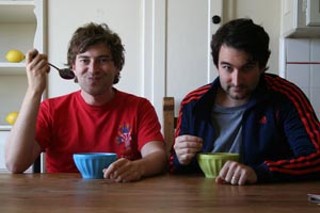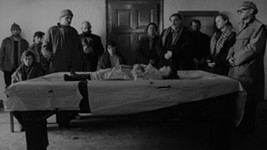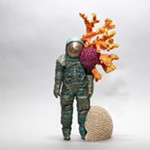Shooting Loose, Long or Short
The Duplass Brothers discuss how they found 'The Puffy Chair,' and where they're headed now as it hits theatres
By Spencer Parsons, Fri., June 2, 2006

"Our relationship is that I keep trying to get Jay to make a movie, and he's like, 'It's not good enough, it's not good enough.' And a lot of the time, he's right, but I'm still pushing at him just to make it, so we have no choice but to make it good enough so we can do it." The goading that eventually produced the nuanced hilarity of The Puffy Chair began in earnest at Sundance 2004, when brothers Mark and Jay Duplass screened their short film "Scrabble," a follow-up to "This Is John," which had run the previous year in the festival's shorts competition. They vowed that in 2005, they'd return with a feature. But most of their ideas and scripts were for elaborate movie-movies, totally unlike the stripped-down, performance-based shorts that had taken them to Park City in the first place.
"We decided at Sundance to make a film from our lives rather than from what we had been writing," says Jay, and, within the year, the brothers were back with a feature that quickly became known as more than good enough, backed by ecstatic audience response, strong reviews, and the representation muscle of John Sloss' Cinetic Media. If it took them another year to finally work out distribution with the partnership of Roadside Attractions and Netflix, that lag time hasn't deterred them from approaching the making of their next film the same way. While the former Austinites return to town for the theatrical opening of The Puffy Chair, they'll be casting and scouting locations for their next feature.
Austin Chronicle: When the film premiered at Sundance, immediately I started hearing from friends and acquaintances who were just crazy about it; like, not just entertained, but who really loved this film. It just seemed odd that you could have such incredible audience response at major festivals and then take a year for distribution to come through. So why didn't distributors catch on?
Jay Duplass: It was weird, because it actually wasn't just audience enthusiasm, it was distributor enthusiasm, too. It was like everyone was in love with it.
Mark Duplass: We were convinced from the first screening that we were going to sell for, like, $2 million because of distributor feedback.
JD: And we were asking everyone, you know, "Is this normal? Does everyone get this?" And they were like, "No, it's not normal."
MD: We went in with our expectations adjusted, trying really hard not to be those stupid, goofy people you read about who start freaking out at Sundance –
JD: – and we ended up, of course, behaving exactly like those stupid, goofy people.
MD: But, you know, I don't think your characterization is right, because distributors really did catch on right away. They did like the movie, but we kept hearing, "We love this movie so much, but it has no stars, and it's shot on DV, and we just can't do it. We got tons and tons of video and cable offers. It seems most people think that over five years that word of mouth will make a DVD success of this movie. But they also say that you can't make it happen theatrically. Theatres can only give a film a few weeks to perform, and if you don't perform, it's over.
JD: The obvious thing was that we didn't have any bankable stars. The movie looks really small, and it's really funny, and it deals with romance and stuff, but it's not really a romantic comedy –
MD: – or any genre you can easily market. But when you're a small movie like this, you can also get underdog status, and people love and champion the film. It's like discovering Nirvana's first demo or something, and so people want to own the experience.
AC: Okay, but so aren't you guys about to do another movie on a similar budget in the same style and without stars? Aren't you just making the same mistake all over again?
JD: [laughs] Right. Well, the movie is about unknown actors. Everyone always says a movie can't be done without stars, but this one has to. I mean, the point is it's about actors who want to be famous but aren't famous.
MD: We actually had some offers. We could have funded this one through a studio if we wanted to, but with stars the movie wouldn't work, and without them the financing wouldn't work.
AC: Things had already started to change for you guys when your shorts started playing at Sundance.
JD: Yeah, I guess they started the inevitable roll toward Puffy.
MD: More than you know. It's not only because they brought us attention, but they were a total break in style with everything else we'd done up to that point, too. Quite frankly, everything we were making up to that point was terrible.
JD: But there was no great revelation to it. We just wanted to do something really small and that cost nothing, and it seemed pretty funny to do a short about a guy trying to record a perfect answering-machine message. We just kind of woke up one morning and took a shit, and "This Is John" came out. We never know what we're doing until people tell us what we're doing. Until "This Is John" and "Scrabble" and "Intervention," we'd work from concept first, but on the shorts, it kind of changed.
AC: Well, for me, the thing that comes out in the shorts that's more fully realized in the feature is the kind of characterization you guys get into. Like, in "Scrabble," Mark, I wasn't sure if the guy you were playing was supposed to be as much of an asshole as he seemed to me, but then when I saw The Puffy Chair, it clicked, and I realized you guys weren't intimidated by needing to keep your characters likable at all times.
MD: I'm not really an experienced actor, and so if I'm imitating a guy I know, then I can carry it off pretty well. And so in the case of "Scrabble," there was this guy that we know, and so I just dressed like him and played him.
JD: What we do is shoot pretty loose and then reshape it in editing. So, we're attracted to subtleties, and we shape it around that. It's riding a really fine line, what's funny, what's dark.
MD: We really don't know till the editing room, so it's more like documentary. We try to get the most human, funny, dark stuff in the moment and then pull it together into a scene in the editing room.
AC: That makes for a relationship comedy that's a lot tougher than you might initially expect.
JD: Well, we'd had success with the short films making movies about stuff we know. And we find ourselves talking a lot about relationships, how one day you can be totally in love, and then suddenly not be, and so you try to figure that stuff out.
MD: We grew up actually talking to each other about this kind of stuff when we were like, 12 or 14, sort of really started early discussing how relationships work. And so that was something we figured we had to offer and that we could really use all this and make fun of ourselves while we were at it.
And we figured, we know how to make 10-minute movies, so why not make 9 of them? And at first, we thought we'd just rent an apartment and shoot this relationship film with me and Katie [Aselton]. Which, you know, would have been the quintessential kiss of death. So, then Jay came up with the idea of throwing Rhett [Wilkins] into the mix. Jay had met Rhett in an acting class, and the idea was to have the character be very much like Rhett the person.
JD: So, you have this Type A couple plus Rhett, and it would be hilarious. That's very much from our sort of "available materials" school of filmmaking. Write for people you know and can get into your movie, rather than make something up and then try to pluck somebody from the atmosphere who can play it. So, we had him kind of playing himself three years before the film and maybe amped him up a little bit.
AC: He's really tremendous in the film. I've heard that he's gotten some attention out of it, but he kind of doesn't even return people's calls.
JD: Well, you know, that's funny, because the thing that's great about Rhett is how totally true he is to himself, and a lot of the time that doesn't involve being in movies. He's very spiritually centered and is totally devoted to figuring out where the universe is leading him.
MD: And if you let the universe lead, it generally isn't going to lead you into an acting career.
JD: In the film, we wanted to introduce Rhett in the right way that's really true to him, but doesn't play into the usual hippie-stoner sort of clichés. And we kept banging our heads against the wall about it until we went with this thing he really did, which was to spend two days out in the parking lot of his apartment complex –
MD: In a glorified bush.
JD: Yeah, like two bushes and a tree, and he got in there with a video camera to film these lizards he had made friends with. And then he sent us the tape.
MD: It's our favorite movie of all time. So, when we show the footage he's been taking in the movie when he's first introduced, it's real. The original tape. You can't make that kind of stuff up.
JD: We can't, anyway. ![]()
The Puffy Chair opens in Austin on Friday, June 2. For a review and show times, see Film Listings, p.82. For coverage of the film during SXSW 05, where it received the Emerging Visions Award, see "Uneasy Lovin'" (Screens, March 11, 2005).










